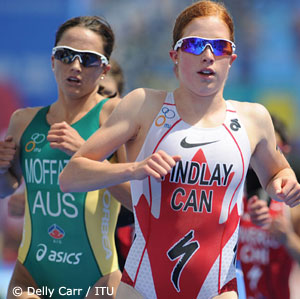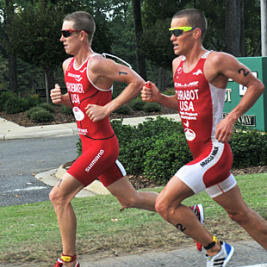Sarah Groff breaks through
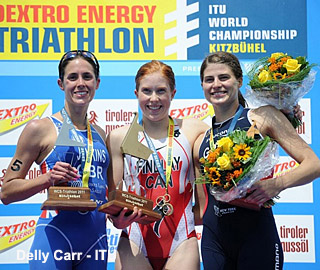
Sarah Groff of Cooperstown, NY, a cross country runner and swimmer in high school and an NCAA All-American swimmer at Middlebury College was somewhat of a late blooming triathlete. But at 25 years old in 2007, she won the Geneva ITU Pan Am Cup and placed 4th at the Edmonton World Cup and was a member of the runner-up USA squad at the ITU World Team Championship.
In 2008, under the coaching of Siri Lindley, she was 2nd at the Huatulco World Cup and placed 7th at the ITU World Championship in Vancouver. At the first 2008 USA Triathlon Olympic Trials in Tuscaloosa, Julie Ertel won the first Olympic spot and Groff was third, just 9 seconds behind established star Sarah Haskins. By the end of 2008, as her rivals went on to Beijing, Groff finished top American woman and 4th overall in the ITU World Cup season series.
In 2009 Groff finished in the top 10 at three top ITU races including 9th place finishes in the new, prestigious World Championship Series events in Madrid and Washington DC. She also finished 2nd American woman in the WCS series. In 2010, after signing on with coach Darren Smith and his group of top ITU triathletes including Lisa Norden and Barbara-Riveros-Diaz, Groff took 12th at London, 10th at Kitzbuhel and 8th at Hamburg. She also took 2nd at the USA Triathlon Elite Championship and 5th at the US Open Toyota Cup finale in Dallas. Mustering such respectable performances was a minor miracle considering that from the start of the year she fought off a bad sinus infection, overtraining setbacks, and a twice-fractured sacrum. By the end of the year, she could barely walk and was not strong enough to start full time training again until late February.
Cut to June of 2011. People all over the planet, some who knew her well and many who did not, were moved to cheers and happy tears watching the ITU live int6ernet coverage of Groff’s incredibly beaming smile after her breakthrough 3rd place finish at the World Championship Series event in Kitzbuhel last Sunday. In that race, Groff ran with eventual winner Paula Findlay and second place finisher Helen Jenkins until the broke away with a kilometer to go. Along the way, she outran two-time ITU World Championship series champion Emma Moffatt and fellow Darren Smith-coached teammate and good friend Barbara Riveros-Diaz of Chile. Groff now jumps into contention with highly heralded and far more experienced countrywomen Laura Bennett and Sarah Haskins for that first Olympic slot available at London on August 6.
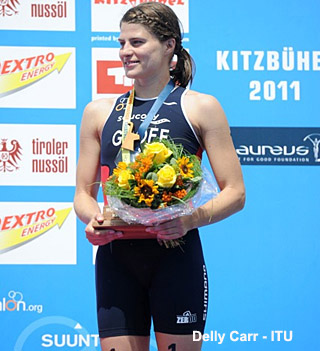
Slowtwitch: Could you offer a glimpse into the many layers of emotions you must have felt dueling for the lead with great triathletes like Paula Findlay and Helen Jenkins – and when you crossed the line with your first World Championship Series podium?
Sarah Groff: While I was racing, I was really just focused on the process of running and wasn’t thinking about anything outcome oriented until we had a lap to go. At that point, Helen surged and Paula was able to go with her. I was shocked to realize that, as long as I managed myself well, I might be able to come away with a podium finish. When I crossed the line, I thought about how much I’ve had to fight in this sport, how nice it felt to have a result that I was finally proud of and how grateful I am to be healthy again. I also imagined my amazingly supportive family and friends, watching the coverage on their computers, and sharing this result with me.
ST: What satisfaction did you take from out-dueling two-time WCS champion Emma Moffatt for 3rd place? Of setting third fastest run?
Sarah: Emma Moffatt is obviously a tremendous athlete. I wouldn’t say that I had any great satisfaction out of outrunning her. As for the run split, it is satisfying knowing that my hard work is starting to pay off.
ST: What was it about the Kitzbuhel course that suited you?
Sarah: I wouldn’t necessarily say that the course itself suited me. The cool conditions were definitely more favorable for me, however.
ST: What did your fellow Darren Smith athletes tell you after your great performance?
Sarah: When I was on the podium, I could spot my training partners Kate
Roberts [23rd] and Lauren Campbell [DNF] celebrating for me and there are few things more heartwarming than knowing that, despite their own disappointments, they were able to be so happy for me. My training partners have been really supportive after the race. After watching me struggle so much in 2010, I think that they knew what this result signified to me.
ST: What did Darren tell you before the race – and after?
Sarah: Before the race, he just reminded me to focus on the process and try to do everything right. Afterwards, he admitted that he teared up a bit upon my finish and said that he was proud of me.
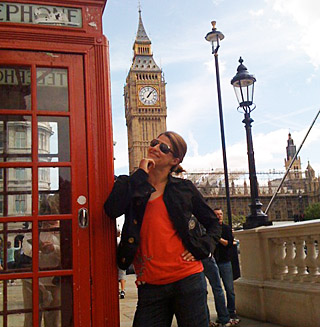
ST: What did this do for your confidence going forward in your quest to make the 2012 Olympic USA women’s team?
Sarah: I will still have to fight to get onto the Olympic team; this result
doesn’t change that. It is comforting to know that I am heading in the right direction, however.
ST: So-called experts including myself probably thought you would be hoping to get the third spot on the USA Olympic squad after Sarah
Haskins and Laura Bennett. However, your fine 7th-place finish at Madrid ahead of Laura Bennett seems to have been a sign of your rising fitness. How confident were you going into Kitzbuhel?
Sarah: Honestly, I wasn’t especially confident. We’ve done some good work, but we still haven’t done much real quality. I hope that I will be able to build upon my current fitness and layer on some more speed. Haskins and Bennett are really fine racers who will be incredibly well-prepared to make the Olympic team. They have, and will continue to, set the bar high for me.
Sarah: Could you elaborate on your post race comment saying that unlike 22-year-old Paula Findlay, you were 29 and weren’t at the beginning of your career?
Sarah: I am 29. By contrast, Paula is the best in the world right now at 22 and she just started racing at this level a year ago. She has years ahead of her and unknown potential. For me a podium finish is all the sweeter for the years that have gone into fighting to become a better athlete.
ST: You suffered through a 2010 that you termed a struggle. Could you
elaborate on your injuries/illnesses and difficulties you endured and how they affected your results?
Sarah: I fractured my sacrum twice in minor spills on the bike; one in March and refractured it again in November. I tried to race and train
through it the first time, but the second time I couldn’t even walk without pain for months. In the time between crashes, I found myself sick, overtrained, stressed and unhappy for most of the year. The fact that I was able to walk away with a few respectable results in 2010 was almost a miracle.
ST: How did you get through all that? With the guidance of Darren Smith I presume?
Sarah: Darren helped me work on the aspects of the sport that we could control. Without the ability to rely on hard work and fitness, as I would have in the past, I had to learn how to become a smart, more skilled athlete. He was extremely patient with me last year and in my rebuilding at the start of 2011; the year hasn’t been easy on either of us. I’m also incredibly lucky to have really supportive training partners, friends and family.
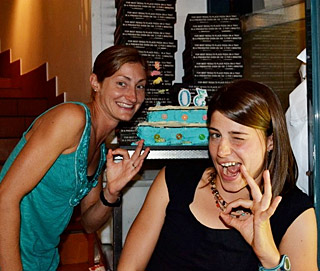
ST: What was different this year in your preparation for 2011?
Sarah: After taking the winter off of biking in order to let my fracture heal, I had to essentially learn how to run again. We had to build my bike and run training back very gradually and I essentially missed the base training phase of my season. While I think that is was important for me that the gradual return to running allowed me to rework my run technique from scratch, I wouldn't recommend missing these critical months of training. We were actually surprised how quickly my fitness came back after such a long break.
ST: What signals in your training in 2011 indicated that you were reaching a new level?
Sarah: Since I couldn't train in January, and February and March were a rebuilding back to fitness, I really had no indication that I was reaching a new level per se. Towards the end of my camp in Australia, however, after I had a few weeks of decent running training under my belt, I was starting to realize how much more robust and symmetrical I felt as a runner.
ST: How disappointed were you with your DNF at Sydney? What happened there?
Sarah: I was part of a bike crash halfway through the bike. When I popped back up uninjured, I immediately grabbed my bike to try to rejoin the group. Unfortunately my bike was unrideable and I had to call it a day.
ST: How did you regroup emotionally after that disappointment?
Sarah: Sometimes you simply have bad luck. I was following some good bike handlers and we were on a straightaway. There was no way that I could have anticipated the crash or avoided it. More than anything, I was disappointed because I was feeling good and was ready for a strong race. You can't dwell on something like that, but just look ahead to the next race.
ST: Is this something you had dreamed of or imagined many times?
Sarah: No. I thought that I might be capable of being on a podium eventually, but I didn’t think that I was quite ready.
ST: I still remember that you came within 98 seconds of that first Olympic slot at Tuscaloosa in 2008 – and were just 9 seconds back of established star Sarah Haskins. What did you think of your race that day?
Sarah: To be honest, I wasn't ready to be on the Olympic team. I was physically capable of making the team, but I just wasn't a confident enough or skilled enough racer.
ST: Were the Olympics part of your dreams as a young athlete?
Sarah: Nope. My dream as a kid was to be an ornithologist, not an athlete.
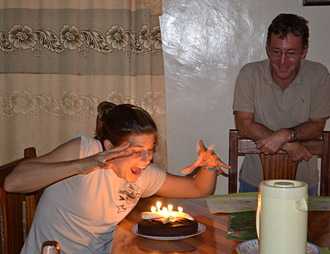
ST: What led you to ask Darren Smith to be in his squad?
Sarah: I wanted to be part of an ITU-focused squad and had admired the work that he had done with Lisa Norden and Daniela Ryf. There simply aren't the same opportunities in the U.S., so I was forced to look overseas for a program that fit my needs.
ST: What sorts of questions did he ask of you when you applied? Obviously he
places a large emphasis on his athletes get along and what each brings to the overall camaraderie of the squad.
Sarah: We both did a bit of background research on the other person. I asked a few of his former and current athletes about the program and his nature, as well as asking coaches I respect, like Joel Filliol, what they thought about Darren as a coach. He did his own background check on me and I somehow passed. More than anything, however, I think that we learned the most about the other person through exchanges at races and through emails. By watching how a coach interacts with their athletes at a race, you can learn quite a bit. Likewise, watching how an athlete conducts themselves at a race can show you a lot about their personality.
ST: What has Darren Smith brought out in you?
Sarah: More than anything, Darren has emphasized patience and an attention to detail; both characteristics which I had previously lacked.
ST: In one of your blogs, you mentioned you had a little squabble with your beloved coach and were glad you both got over it. I know he thinks highly of you and was gratified by your excellent recovery from the woes of 2010. Sound like you were frustrated and upset about your injuries. Could you tell us a little about that moment.?
Sarah: At times, Darren and I can both be stubborn, reactive know-it-alls. We've had some interesting exchanges in the past where I like to challenge him and neither one of us will back down. Sometimes he tolerates it; he once stated, "Groffy, we like a bit of passion around here" after one such exchange. At other times, however, I push a bit too hard. Thankfully I've learned to save the debates for outside of training sessions! We've been able to make it work, since at the bottom of it lies a foundation of mutual respect and affection.
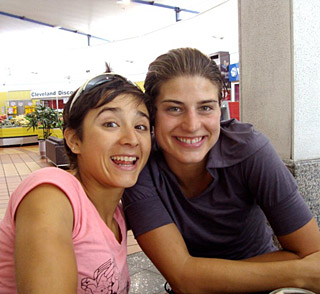
ST: Can you talk a bit about your affinity with Barbara Riveros Diaz?
Sarah: Barbara is a sweetheart, but also tough as nails. She is more focused on being successful in triathlon than any athlete that I’ve ever met. She is younger than me, but I’ve learned a lot from her.
ST: Even while you were struggling yourself, what did seeing Barbara’s rise to success teach you? Inspire you?
Sarah: It was incredible to watch Barbara have such a breakthrough year in 2010, as did my training partners Vicky Holland and Kate Roberts. Watching them reinforced the importance of consistency, focusing on
the process and believing that the hard work will pay off eventually.
ST: As I remember, Darren Smith told me that everyone in the squad is fondly amused by your quirky approach to life, which you share with Barbara Riveros-Diaz. Explain?
Sarah: I think that it would be more accurate to say that the others are by and large tolerant of my sense of humor, rather than particularly amused. I would have to say that Barbara and I both share a fondness for winding up Darren and teasing him a bit. Our training partners definitely appreciate that, especially if he is in a mood.
ST: Will you race in Hamburg, or will you save yourself for London? Why?
Sarah: I will race in Hamburg. I'm still at the stage where I need to practice racing, so it makes sense for me to get another race under my belt. Since I'm already in Europe, it isn't that hard of a trip. Plus, I love the atmosphere of racing in Hamburg- it is a blast!
ST: How have your previous races in London gone?
Sarah: Pretty well. Last year I was still dealing with injuries and finished 12th.
ST: How has it been to get so many congratulations? Have any of them stood out?
Sarah: I was surprised how many people were moved by my emotional finish. Helen Jenkins sent me a message, saying that the seeing my reaction on the video actually made her get a bit teary-eyed. She is such a sweetheart. I got a few similar messages from friends, family and complete strangers.
ST: Tell us about your close relationship with your father and mother and what their support has meant to you? What is their athletic background?
Sarah: My dad was always an athlete growing up and sports were an important outlet for him and his brothers. He played lacrosse as an undergrad at Franklin & Marshall, but put it aside in order to focus on his medical studies. My mother grew up as a baton twirler (so much has changed in women's sports!) and was the head majorette for Franklin & Marshall, but she discovered that she was an endurance athlete at the age of 40 when she first started running. My parents were always supportive of whatever interests my siblings and I had, although I think that, as the youngest, I may have monopolized their time a bit more. My dad has been particularly supportive of my triathlon career and would try to attend all of my races if I would allow him.


